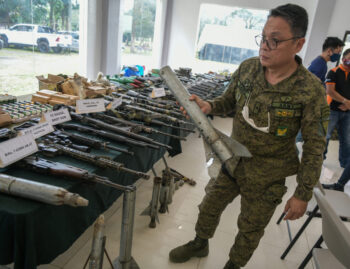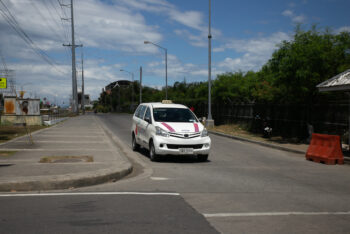(Amina Rasul, President of the Philippine Center for Islam and Democracy delivered this opening statement at the Media Roundtable on the Bangsamoro Basic Law, Faber Hall, Ateneo de Manila University, on September 22, 2014)
First of all, allow me to congratulate once more Chair Miriam Coronel Ferrer and government, Chair Mohagher Iqbal and Bangsamoro Transition Commission, the Moro Islamic Liberation Front and the supporters of the Bangsamoro and peace for the Bangsamoro Basic Law. Time is tight and resources are limited. We hope that the calamities that have visited the Philippines, both disasters due to man and to nature, will not distract government and development partners from their commitment to support the Bangsamoro. We have a small window of opportunity before 2016 election fever sets in, to set things right in Muslim Mindanao.
For our colleagues in media, thank you for joining us at this Media RTD on the BBL. Your role is critical in educating our various publics. It is crucial to have media be extremely well informed about the BBL and the aspirations of the Bangsamoro people. The last thing we need is to have a repeat of 2008.
If you recall, the constant use of the terms “dismemberment of the nation” and “rape of the Constitution” were phrases that galvanized widespread opposition against the MOA-AD in 2008, which led to the junking of that agreement. And yet the document would neither lead to dismemberment or rape, as it would have to pass the Congressional process and later a plebiscite. Educating our constituents will ensure that the Bangsamoro Basic Law will be discussed in a rationale manner, based on fact and not half-truths.
This discussion on the Bangsamoro Basic Law is happening right after the success of the United Kingdom in keeping their State whole after a plebiscite for independence in Scotland. Scotland actually said they would rather stay in the Union. Here was a clear case of one nation, one group wanting independence but upon referendum, the majority said no. It’s democratic, it’s allowed in our system: majority rules. In our particular case, our liberation fronts have waged wars of independence for decades and, through the peace agreements, have agreed to genuine autonomy in lieu of independence. I keep asking the same questions over and over again: isn’t the grant of autonomy a fair price to pay for a just and lasting peace within a united, not dismembered, Philippines?
The legitimacy of the Moro wars for independence laid the basis for our peace negotiations, which led to the creation of a region of autonomy for our Moro brothers and sisters, through legislation. I also ask: can the Philippines afford the resurgence of armed conflicts in the South, violence that could escalate beyond the boundaries of the Moro provinces?
In a world where disenfranchised minority groups have escalated their wars for independence, shouldn’t we do all we can to pass legislation that will satisfy the demands of the Bangsamoro but keep the Philippines united?
This week, Congress starts its hearings for the Bangsamoro Basic Law. Oppositors to the BBL will cite its unconstitutionality. I note that in the Preamble, the draft BBL states: “In consonance with the Constitution and the universally accepted principles of human rights, liberty, justice, democracy, and the norms and standards of international law, reflective of our system of life prescribed by our faith, and in harmony with our customary laws, cultures and traditions.” Elsewhere in the document, there are clear references to national and international law, unity of the Philippines, respect of human rights, and democracy.
Can we really afford the alternative – internecine wars that will, this time, be waged outside the boundaries of the Moro provinces? Recall what happened in Zamboanga City last September. Time and again, we have seen the results of military solutions to wars for independence – no peace but destruction and more conflict. We should know by now that not only is peace its own reward but that peace is a precondition we need for the takeoff of the Mindanao and Philippine economy to a higher level.
Peace in the South can level up Mindanao’s contribution to GDP. Mindanao has abundant primary resources, perfect agro-climatic conditions, lower wage rates (with the ARMM cost half of average labor cost in Mindanao), still lower power cost (but supply reliability a problem), and vast opportunities for growth and diversification thru its BIMP-EAGA connection.
As for opportunities in the ARMM, soon to be the Bangsamoro, the region has the biggest areas of untapped natural resources (the Chinese are already mining in Tawitawi but, according to news, not paying the appropriate taxes and fees); rich fishing grounds and fertile lands; closest cultural and historical links with Brunei, Indonesia and Malaysia which can allow the region to access new capital thru Islamic financing as well as new export market in the still growing halal industry. Further, the barter trade between Sulu and Malaysia is an economic tie that is centuries old and can be revived, with BIMP-EAGA.
Further, the ARMM is capable of regional legislation such as providing incentives to potential investors. The Bangsamoro will have more powers to support development.
However, impediments to the development of Mindanao need to be addressed: lack of infrastructure, problems of access to land and respect of property rights, the power situation, governance and institutional weakness and – complicating all of these already complex problems – peace and order.
In spite of its current challenges, ARMM has contributed to GDP. More than 60% of the country’s agri-products came from Mindanao. ARMM has contributed over 11% in corn production; over 11% in coffee production, 8% in coconut production; and almost 4% in palay production.
ARMM has the highest contribution to national fish production, accounting for 17.5 percent in volume but only 6.5% of value (BFAR, 2010). Seaweeds, an acknowledged export market winner is largely cultured in Mindanao, accounting for 56 percent of national output from 2003 to 2008, growing at over 12 percent within the same period. It is important to note that ARMM accounts for 70 percent of the Mindanao production. AS for Philippine banana exports, all from Mindanao, ARMM contributes more than CARAGA or Region IX: Region XI contributed about 41% of the Philippine production, followed by Region XII (11.2%), Region X (10.1%), ARMM (6.8%), CARAGA (3.6%) and Region IX (3.2%).
Imagine if we had a just and lasting peace!
We at the Philippine Center for Islam and Democracy fully recognize the growth potentials of Mindanao and the rest of the country with peace and stability in the ARMM, soon to be the Bangsamoro. In partnership with the Foundation for Economic Freedom, chaired by former Finance Secretary Roberto de Ocampo, we have been organizing a series of workshops on Strengthening the Business and Investment Climate for the Bangsamoro. I am pleased to inform that the initiative is led by former Finance Secretary Gary Teves.
During the first conference held at the Waterfront-Insular Hotel in Davao City last November 26-27, around 120 participants from the private sector, development partners, government, ARMM and the Bangsamoro discussed what should be the Bangsamoro development priorities in order to strengthen its economic foundation. We have, since then, organized a workshop on banking and finance, with special focus on Islamic banking and finance, in partnership with the Bangko Sentral ng Pilipinas. We also organized a workshop on land and property rights, in partnership with the UP Law Center. Tomorrow, we will have the 3rd thematic workshop – on business and labor policy – at the AIM. The 4th will be on fiscal management, to be held in November.
Former NEDA Secretary Dondon Paderanga, who chaired the conference in Davao, cited the critical role of the private sector in his synthesis. Private sector is key to bridging Muslim Mindanao from the challenges it faces to the opportunities available in agri-business, power, mining and natural resource development, tourism and trade. To do this, the region must address the constraints: governance and policy; peace, law and order; sustainable infrastructure, including human infrastructure; skills for the business sector and the state of education. Let me note here that a third of the labor force of ARMM are illiterate – that’s over half a million. For me, adult illiteracy is a low-hanging fruit that can be addressed immediately, and with great positive effect on empowering the Bangsamoro.
Dr Paderanga, a Mindanaoan, summarized the immediate (and doable) strategic interventions: investment promotion and identification of projects as well as for the Bangsamoro to negotiate and determine its economic goals of fiscal autonomy and an autonomous economic strategy, not too tightly bound by the strings of Manila.
In the medium to long-term, the Bangsamoro will need to put the fundamentals in place for business and labor regulation, incentives and business support, land and property rights, banking and finance including Islamic finance.
It cannot be business as usual. Autonomy provides the Bangsamoro with the legal foundation to set its own strategy, a power it has not exploited in the past. The BBL should provide for a strong economic foundation for the region (otherwise the tax base is weak). Fiscal autonomy is the best way to provide for genuine autonomy. If the Bangsamoro cannot stand on its own feet but must constantly rely on grants from the central government, then it is paper autonomy. One is a dependent when one has to ask Papa for an allowance.
For the sake of the nation as well as the long-suffering Bangsamoro, we need to exert all efforts to ensure that the promise of autonomy made to the Bangsamoro decades ago is converted to reality. A truly autonomous Bangsamoro will contribute to the growth and wellbeing of the entire nation. A dysfunctional Bangsamoro, as the ARMM is today, will continue to be a millstone that will drag the Philippines down. Seems to me that there is only one rational choice. Rational men and women lead the two houses of Congress. Surely, the rational choice will prevail. (MindaViews is the opinion section of MindaNews. PeaceTalk is open to anyone who wishes to share his/her thoughts on peace in Mindanao. Amina Rasul is President of the Philippine Center for Islam and Democracy).







